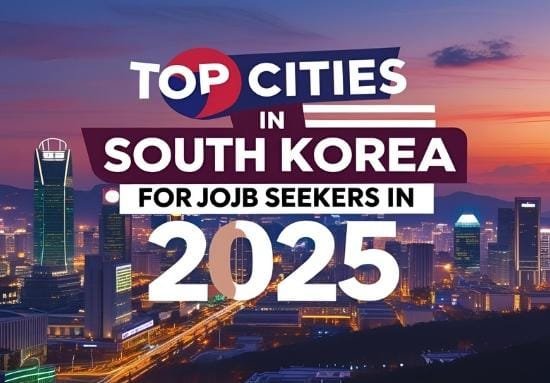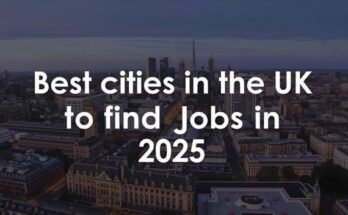Top Cities in South Korea for Job Seekers in 2025
Are you on the hunt for dynamic South Korea employment opportunities? The year 2025 is a critical juncture for the South Korean job market. It highlights cities bursting with potential and innovation. This detailed analysis looks ahead, revealing the most promising urban hubs for South Korea’s 2025 job opportunities.

With data from South Korea’s Ministry of Economy and Finance, and insights from Forbes and the Korea Trade-Investment Promotion Agency (KOTRA), we delve into each city’s economic growth and industrial prowess. Whether you’re a local talent or an international professional, this guide is your roadmap through South Korea’s vibrant 2025 job scene.
Key Takeaways
- Innovative job markets expanding across South Korea’s metropolitan areas.
- Economic forecasts and development projects shaping future employment.
- Insights on thriving industries for both domestic and international job seekers.
- Crucial data about the South Korean job market from authoritative sources.
- Tailored advice for preparing to join South Korea’s workforce.
Introduction
South Korea’s economic rise is a shining example for professionals globally, offering unmatched opportunities for career growth in South Korea. Cities like Seoul, Busan, and Incheon are at the forefront, driven by the evolving job market trends in South Korea. These urban centers stand out as the South Korea top cities for work.
The blend of technological progress and global business integration in South Korea opens a vibrant path for career advancement. The McKinsey Global Institute sheds light on the nation’s labor market’s flexibility and expansion. This underscores the vast opportunities available.
The table below combines data from the World Bank and the Korea Economic Research Institute. It offers a detailed comparison of economic indicators and job creation metrics across key South Korean cities. This data not only reflects the current state but also highlights the growing opportunities for job seekers.
| City | Annual Economic Growth | Job Creation Rate | Key Industries |
|---|---|---|---|
| Seoul | 3.5% | 2.1% | Technology, Finance |
| Busan | 2.8% | 1.8% | Maritime, Logistics |
| Incheon | 4.0% | 2.5% | Trade, Biotech |
These thriving urban centers are not just economic powerhouses but also gateways to significant professional growth in Asia and worldwide. As we explore each city’s specific sectors, remember that career growth in South Korea spans diverse industries. This is shaped by strong economic strategies and forward-thinking urban development.

Seoul: The Economic Powerhouse
Seoul is a symbol of South Korea’s advancement, leading in information technology and finance. It’s a city known globally, fostering a vibrant start-up ecosystem. This environment offers a plethora of IT and finance jobs, drawing talent worldwide.

The Booming IT Sector in Seoul
Seoul is a technological innovation hub. Its IT sector grows fast, backed by significant investments. Jobs in software, cybersecurity, and integration are abundant, boosting the demand for IT professionals.
Finance & Business Opportunities in Seoul
Finance in Seoul is thriving, with the city at the heart of South Korea’s financial scene. It’s home to major banks and investment firms. This environment supports a complex financial ecosystem, driving growth and innovation.
Start-Up Culture and Support
Seoul’s start-up ecosystem is lively, with many accelerators and government support. The Seoul Global Startup Center is key, offering resources to entrepreneurs. This ensures Seoul leads in start-up development and tech advancement.
| Industry | Opportunities in Seoul | Support Mechanisms |
|---|---|---|
| Information Technology | Vast job openings in tech sectors such as AI, software development, and cybersecurity | Initiatives by the Korea Internet & Security Agency for sector growth |
| Finance | Diverse roles in banking, investment firms, and FinTech startups | Regulatory and infrastructural support from Seoul Metropolitan Government |
| Start-Ups | Dynamic environment for entrepreneurs across tech-based industries | Incubation programs, funding opportunities, and business development services |
Incheon: Gateway to International Business
Incheon’s strategic location as a bridge between Korea and the wider world has cemented its status as a key player in international business. The city’s role is amplified through the Incheon Free Economic Zone (IFEZ) and its robust logistics and trade infrastructure. These elements are crucial for Incheon job growth, especially in aerospace and biotechnology sectors.
According to the Incheon Free Economic Zone Authority, the IFEZ is designed to be a comprehensive hub for global business, fostering immense job opportunities and international collaborations.
The Incheon Free Economic Zone (IFEZ) is the cornerstone of the city’s economic strategy. It enhances IFEZ careers through innovative policies and cutting-edge facilities. This special economic zone attracts a plethora of foreign investors, driving significant economic activities.
Logistics and trade are the lifelines of Incheon’s economy. The city’s state-of-the-art port facilities make it a crucial node in the international supply chain. Advanced logistical frameworks amplify trade activities and economic exchanges globally.
Moreover, Incheon aerospace jobs are soaring. Major global aerospace companies are investing in Incheon, drawn by its conducive business environment and strategic geographic position. Through collaborations and the development of a specialized skilled workforce, Incheon is becoming a key player in the aerospace industry.
- IFEZ’s role in attracting global tech and bio-tech companies
- Expansion of port facilities to accommodate larger volume of trade
- New partnerships and continued growth in aerospace manufacturing and services
Busan: A Hub for Maritime and Logistics Industries
Busan is gaining prominence in the global maritime and logistics fields. Its natural harbors and strategic Asian location make it a key trade gateway. This has boosted Busan maritime careers and turned it into a Busan logistics hub. Moreover, tourism and service sector expansions are creating more tourism jobs in Busan, making it a vibrant place for career advancement.
Expansion of Busan Port and Its Global Significance
The recent expansion of Busan Port is monumental. Investments in infrastructure and technology have increased its capacity and efficiency. This has strengthened Busan’s position on the global trade map. The Busan Port Authority’s leadership in these enhancements has significantly impacted job opportunities, especially in maritime and logistics.
The port’s upgrade not only bolsters Busan’s economy but also drives global maritime commerce. It’s a testament to Busan’s role in international trade.
Emerging Sectors: Tourism and Service Industry
Busan’s tourism scene is experiencing a vibrant transformation. An influx of international tourists is attracted by cultural festivals and coastal beauty. The Korea Tourism Organization notes significant growth, leading to a rise in tourism-related jobs.
The service industry is also expanding. The Busan Economic Promotion Agency is committed to fostering a diverse range of services. This supports both local and expatriate populations. The sector’s growth reflects Busan’s innovative approach to job creation and economic development.
Daejeon: The R&D and Science Center of South Korea
In the heart of South Korea, Daejeon shines as a hub of innovation and research, especially in science and technology. It’s known for its lively academic atmosphere and numerous research centers. This makes Daejeon a top spot for those looking for R&D opportunities in Daejeon and Daejeon research jobs. The city boasts a wealth of research facilities and a culture that encourages collaboration across different fields.
The Korea Advanced Institute of Science and Technology (KAIST) is a leading university for science and technology. It has spearheaded many joint projects. These efforts showcase Daejeon’s dedication to linking academic research with industrial needs, boosting the real-world application of science.
The government also sees the value of this area and supports science start-ups in South Korea with financial backing, resources, and infrastructure. These actions are vital for a vibrant ecosystem of innovative companies and for drawing in the best talent globally.
For those aiming to advance in science and technology, Daejeon offers a wealth of opportunities. From cutting-edge research in quantum computing to roles in biotech firms, the city provides a diverse array of R&D opportunities in Daejeon that are rare to find elsewhere.
Daegu: Growing in Healthcare and Manufacturing
Daegu, South Korea’s fourth-largest city, is witnessing rapid growth in healthcare and manufacturing. Historically known for its textiles industry, it’s now a hub for robotics and medical fields. This transformation offers numerous career opportunities for professionals in these sectors.
Medical Tourism and Healthcare Services
Daegu is establishing itself as a major player in the medical sector, especially in healthcare services and medical tourism. The city’s efforts to attract medical tourists have been successful, thanks to its high-quality cosmetic surgery, dermatology, and wellness programs. The demand for Daegu medical jobs is on the rise as clinics and hospitals expand to meet the needs of international patients seeking affordable, top-notch medical care.
The Robotics and Textiles Industry
The traditional textiles industry South Korea is undergoing a transformation in Daegu, thanks to the integration of advanced robotics technologies. This integration has not only improved textile production but also created new job opportunities in a sector that blends tradition with innovation. The adoption of robotics in textiles showcases how old industries can evolve with new technologies, making Daegu an attractive destination for tech-savvy professionals.
In summary, Daegu’s job market is dynamic, with a focus on healthcare and manufacturing. The city’s growth in medical tourism and robotics in textiles makes it an ideal place for those looking to start or advance their careers. Daegu’s environment is conducive to continuous growth and innovation.
Gwangju: Focusing on Eco-Friendly Technologies
Gwangju, South Korea’s metropolitan hub, is at the forefront of sustainable development. It’s leading the charge in green technology, offering promising jobs and career opportunities. The city is committed to reducing its environmental impact and creating jobs in green car projects and solar industries.
The Green Car Project in Gwangju marks a significant step towards cleaner cars. With investments from both public and private sectors, it aims to make electric and hybrid vehicles more affordable. This move not only cuts down on environmental harm but also creates jobs for engineers, designers, and technicians.
Solar industry careers in Gwangju are also a key focus. The city plans to increase solar energy production, offering jobs in engineering, project management, and more. Local policies support renewable energy, creating a strong market for solar jobs.
Gwangju is fostering a green economy, improving sustainable living and contributing to Korea’s energy goals. By aligning development with environmental sustainability, it’s creating a future where green tech drives growth. This strategy showcases Gwangju’s role in national progress and solidifies its position as a leader in eco-friendly careers.
In summary, Gwangju’s eco-friendly initiatives are a model for other cities to follow. It’s a key player in South Korea’s sustainable development agenda. Whether you’re starting your career or looking to transition, Gwangju offers a dynamic and promising landscape.
Top Cities in South Korea for Job Seekers in 2025
The quest for career opportunities South Korea 2025 uncovers a vibrant tapestry of future job cities South Korea. Each city boasts distinct prospects and industries. Seoul solidifies its role with a robust IT and finance sector. Meanwhile, Busan shines in maritime and logistics, bolstered by its global trade ties. Incheon emerges as an aerotropolis, investing heavily in biotech and aerospace.
Daejeon and Daegu are rising as hubs for R&D and healthcare, respectively. Gwangju stands out for its commitment to green technologies, reflecting South Korea’s dedication to sustainable development.
Understanding these cities’ industries and lifestyles is key for job seekers. Seoul presents a dynamic urban scene, while Daegu offers a more laid-back environment with a thriving local culture. This diversity in South Korea job prospects paints a vivid picture of varied environments and opportunities.
Future economic plans and expansions promise to further transform these cities by 2025. Backed by forecasts from the Korea Development Institute and data from the Ministry of Employment and Labor, South Korea’s evolution as a major global business and innovation hub is evident.
| City | Industries | Emerging Sectors | Lifestyle Notes |
|---|---|---|---|
| Seoul | IT, Finance | Start-Ups, AI Research | High-energy urban environment, extensive cultural amenities |
| Busan | Maritime, Logistics | Tourism, Services | Coastal city with a blend of modern and traditional influences |
| Incheon | Trade, Biotech | Aerospace, Green Tech | Diverse, with growing international communities |
| Daejeon | Research and Development | Nanotechnology, Smart Grids | Academic and young professional populations are booming |
| Daegu | Manufacturing, Healthcare | Robotics, Wearable Technology | Growing cultural scene, family-friendly |
| Gwangju | Eco-Technologies | Solar Energy, Electric Vehicles | Strong community vibe, focus on sustainability |
Understanding the Job Market in South Korea
The job market in South Korea is experiencing significant growth, driven by sectors that require specialized skills. This change is vital for both local professionals and expatriates aiming to enter this vibrant workforce.
Employment Trends and Industry Demand
South Korea’s employment trends highlight the importance of technology, digital marketing, and healthcare. These sectors are expanding rapidly, creating numerous job opportunities. They align with global trends in digital transformation, making IT and medical professionals highly sought after.
Other sectors like semiconductor manufacturing and renewable energy are also crucial to the economy. They offer many opportunities for skilled workers. The focus on a green and digital economy ensures a steady demand for experts in these areas.
Visa and Employment Policies for Expatriates
Expatriates looking to work in South Korea must navigate a structured process to obtain a work visa. This process depends on the type of job and the individual’s qualifications. Various visas, from E-1 to E-7, cater to different professions, including teaching, research, and specialized fields.
The Korean government and business sectors, like the Korea Chamber of Commerce & Industry, are working to simplify visa policies. Their efforts aim to attract skilled international workers, making it easier for them to integrate and find employment.
| Visa Category | Description | Target Professional Area |
|---|---|---|
| E-1 | Professorship | Academic |
| E-2 | English Teaching | Education |
| E-3 | Research | Scientific Research |
| E-7 | Special Occupation | IT, Engineering, Business Consulting |
Preparing for the South Korean Job Market
As you consider entering South Korea’s professional scene, grasping the interplay of job preparation, Korean language skills, and business culture is key. This deep understanding will not only ease your transition but also boost your chances of success in this vibrant market.
Language and Cultural Considerations
Mastering Korean is a crucial step for job seekers. It’s not just about speaking the language; it’s about understanding the nuances of business culture in South Korea. This is essential for successful negotiations and building professional relationships. Cultural awareness is equally important; embracing local customs and practices can greatly impact your career path in South Korea.
Networking and Job Searching Tips
Creating a strong professional network is vital in South Korea. Use platforms like Saramin and JobKorea to connect with industry experts and discover job openings. Being active on these platforms offers insights into industry trends and corporate settings in the area.
| Resource | Uses | Benefits |
|---|---|---|
| Korean Language Education Center | Language Courses | Enhances Korean language skills and cultural understanding |
| Saramin | Job Listings | Diverse employment opportunities and networking potential |
| JobKorea | Job Listings and Company Insights | Provides detailed company profiles, helping in informed decision-making |
Successfully integrating into South Korea’s business world requires a comprehensive strategy. This includes dedicated learning and engaging with key job market platforms. By developing Korean language skills and grasping the subtleties of South Korean business culture, you become a well-informed and respectful candidate. This can significantly advance your career.
Conclusion
Our exploration of South Korea’s vibrant cities reveals a job market teeming with opportunities. From IT and finance in Seoul to logistics and maritime in Busan, each city offers unique advantages. Daejeon and Gwangju, for instance, are emerging as hubs for science and eco-friendly technologies. This growth highlights South Korea’s potential for long-term employment for those willing to explore its job market.
Forbes notes South Korea as a land of burgeoning opportunities, where strategic career planning can lead to significant rewards. Expatriates in South Korea share their positive experiences with the nation’s work culture and high job satisfaction rates. These stories, backed by the Korea Employment Information Service report, confirm South Korea as a place for both work and a fulfilling professional journey.
In conclusion, South Korea’s allure extends from Seoul’s IT and business ecosystems to Daejeon’s research-driven vibrancy. The nation’s focus on innovation, economic growth, and global integration makes it an exceptional choice for career growth. Prospective job seekers are advised to stay updated on industry trends, cultural nuances, and regional developments. With informed approaches and open perspectives, South Korea offers a land of professional promise and personal expansion.



